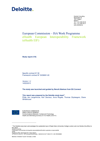The AI model ChatGPT can write administrative medical notes up to ten times faster than doctors without compromising quality. This is according to a new study conducted by researchers at...
Alcidion Group Limited, a leading provider of FHIR-native patient flow solutions for healthcare, and Novari Health, a market leader in waitlist management and referral management technologies, have joined forces to...
Radiologists and radiographers at Northern Care Alliance NHS Foundation Trust have become the first in Greater Manchester to use the Sectra picture archiving and communication system (PACS) to report on...
The same class of artificial intelligence that made headlines coding software and passing the bar exam has learned to read a different kind of text - the genetic code.
That code...
When looking for medical information, people can use web search engines or large language models (LLMs) like ChatGPT-4 or Google Bard. However, these artificial intelligence (AI) tools have their limitations...
A transformative study published in Health Data Science, a Science Partner Journal, introduces a groundbreaking end-to-end deep learning framework, known as Knowledge-Empowered Drug Discovery (KEDD), aimed at revolutionizing the field...
Bayer and Google Cloud announced a collaboration on the development of artificial intelligence (AI) solutions to support radiologists and ultimately better serve patients. As part of the collaboration, Bayer will...
Implementing a single shared digital prescribing record across the NHS in England could avoid nearly 1 million drug errors every year, stopping up to 16,000 fewer patients from being harmed...
Cancer patients about to undergo radiation oncology treatment have lots of questions. Could ChatGPT be the best way to get answers?
A new Northwestern Medicine study tested a specially designed ChatGPT...
9 - 11 April 2024, Berlin, Germany.
The digital health industry urgently needs skilled workers, which is why DMEA sparks focuses on careers, jobs and supporting young people.
Against the backdrop of...
North West Anglia NHS Foundation Trust has replaced two, legacy laboratory information systems with a single instance of Clinisys WinPath.
The trust, which serves a catchment of 800,000 patients in North...
Investigators have applied artificial intelligence (AI) techniques to gait analyses and medical records data to provide insights about individuals with leg fractures and aspects of their recovery.
The study, published in...
